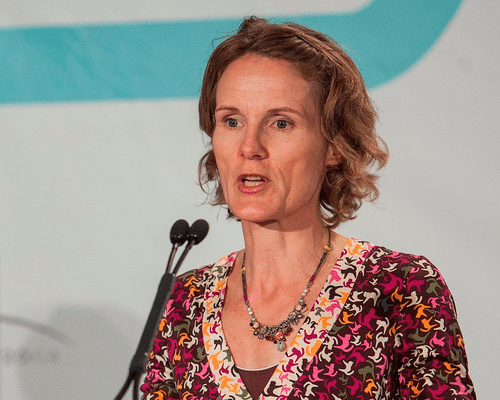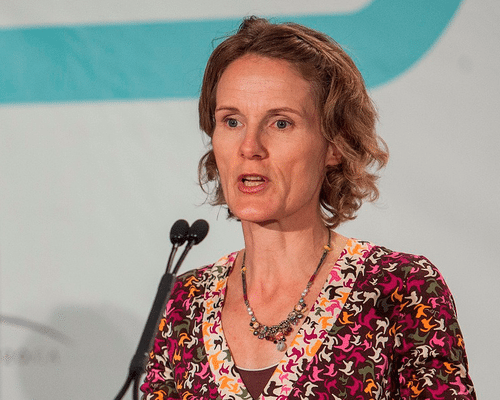
So all of the UK media were up in arms over
the selection of Mark Carney as the new Governor of the Bank of England.
Why such furor?
Because they were all duped into not seeing
him as being off the radar, with most bets on Deputy Governor of the Bank, Paul
Tucker, to take over.
Paul got besmirched in the LIBOR scandal during the summer, but was still viewed as #1
choice.
If not him, folks like Adair Turner,
chairman of the Financial Services Authority; John Vickers, a former BOE chief
economist and the chairman of the government's Independent Commission on
Banking; and Terry Burns, former Treasury permanent secretary and non-executive
chairman of Santander UK were seen as front runners.
This was because the other choices,
including Mark Carney, had ruled themselves out.
Mark Carney is on the record
as saying that if he was offered the role he would not take it.
Interviewed on BBC’s Hard Talk in August, Mark says that it’s a definite no to the role
of Bank of England Governor, and that he’s staying at the Central Bank of
Canada until June 2013 (see 19 minutes 43 seconds into video, or watch the
whole thing if you want to know more about the man).
Note that he doesn’t just say no. When asked whether it was a “no or never”
situation, he answered “both”, leaving no room for doubt.
So what happened to turn the man’s mind around and why such interest and surprise in this
choice of the new head of a Bank that has the ultimate power in Britain (bear
in mind the Financial Services Authority will now be part of the Bank)?
Well, on the latter, there is no doubt that he is a radical but good choice as the new Governor.
First, UK Chancellor George Osborne wanted
Mark Carney in the role because Canada has borne this crisis better than any
other Western nation, and is held up as a shining example of how to run a banking system.
Second, Carney understands the risks and
reach of banking, having been a partner rising through the ranks of Goldman
Sachs for thirteen years before joining the Central Bank.
Third, he is known to be an ‘everyman’ and
a good man manager, something that is a skill lacking in many senior managers
in the bank and central bank system.
Finally, Mark Carney is Chairman of the Financial
Stability Board, and Osborne sees it as a coup to have the global stamp of
authority for stability being the man in charge of stability in the UK.
Osborne had first approached Carney to take
on the role back in February, having met him several years earlier when the conservatives
were in opposition.
Back then, Carney tuned the Chancellor down
as he was concerned what an eight year role would do for his wider prospects.
However, as the tenure was announced
yesterday eight years was reduced to five, with the Governor confirmed through
2018, so that hurdle was overcome.
What is interesting is the unwritten views
of the new Governor, but something that runs as a theme throughout his
commentary on this financial crisis, and that is that the Occupy movement is a
worthwhile outrage against the system.
Here he is being interviewed on The Hour last year:
Watch at 1 minute 42 seconds for his
response to the question: “what do you think about the Occupy movement?”
He has been widely quoted elsewhere as saying that demonstrations like the Occupy Wall Street protests are a
“democratic expression of views’’ and “entirely constructive”.
He repeated the assertion again almost a
year later at the G20 meeting, saying that “they’re angry against the world of finance. I
understand them.”
I’m already warming to the guy as he’s
embracing this movement, rather than ignoring them and, as mentioned in my
SIBOS party blog,
Occupy are the new regulators of the system (or so Andy
Haldane of the Bank of England says).
So, our new regulator has TWO key people
who empathise with the Occupy movement and are drafting the new regulations for
the banking system.
Wow!
But where did Mark get these fairly radical views about the Occupy movement from?
Some might say from his British wife,
Diana.

Picture source: Flickr
Diana Carney has expressed public sympathy
for the anti-banking Occupy movement and has implied that global financial
institutions are “rotten or inadequate”.
As vice-president of Canada 2020, a
Left-wing think tank, she writes on their website this month:
“The
politics of division are coming home to roost. The grass is always greener on
the other side and the Occupy movement has provided a voice to many unhappy
people … I perceive a fear that the institutions that underpin our country and
the global system are either threatened, rotten or inadequate to face down the
challenges of the future. The global financial system comes first to mind.”
Methinks we are going to see change
(bankers’ bonuses, casino capitalism, innovative risk derivatives, shadow
banking).
Meanwhile, a brief resume of the new Governor:
Born in Fort Smith in Canada’s Northwest
Territories to parents who worked in education, he studied economics at
Harvard, after which his college debts led him to a career in finance rather
than his plans for further academica.
At Goldman Sachs, he did stints in the
London and Tokyo offices, before the ivory towers lured him back to complete a
PhD at Oxford, where he met his British wife Diana Fox.
Carney would return to Goldman, before
eventually transferring back to Canada. There, he moved into public service in
2003, after he spotted an ad for a deputy governor’s position at its central
bank.
His colleagues gawped at him ditching a multi-million-dollar
salary for secondments to the finance ministry, but five years later, Carney
succeeded David Dodge as central bank governor.
It is notable that he is willing to pick a fight
to prove his interests are most with the country and the economy, rather than
with the banks. For example, he had a highly publicised argument with Jamie
Dimon, Chief Executive of JPMorgan Chase, and has delivered a series of speeches in which he has warned bankers
against “backsliding”
on tougher capital rules.
Finally, if you really want to know how
Mark Carney’s mind ticks, it is well worth reading this article he wrote for
the Financial Times in May:
A
cautionary tale of inflation and growth by
Mark Carney
The financial crisis has shaken the world
economy and prompted questions that strike at the heart of monetary economics.
As governments, banks and households in
advanced economies struggle to reduce debt, growth has plummeted. Weak growth
is undermining efforts to repair balance sheets and causing more austerity.
This vicious circle is creating problems for all economies.
Against this backdrop, many question
whether central banks are capable of supporting demand while maintaining
economic stability. Some have even advocated extreme responses, such as
pursuing higher inflation or abandoning existing monetary policy frameworks.
These views are misguided. Now is not the
time to risk abandoning frameworks that have proved their worth through the
crisis and will be essential to sustain the recovery.
For example, moving temporarily to a higher
inflation target risks un-anchoring inflation expectations and squandering the
hard-won gains of entrenched price stability. Higher and more uncertain
inflation raises risk premiums and real interest rates, and worsens debt
dynamics.
Central banks are most effective when they
operate with clear and stable objectives. The pursuit of temporarily higher
inflation could only work if policy were anchored to a new target, such as
nominal gross domestic product – total output at market prices, unadjusted for
inflation.
However, the uncertain rewards of such a
regime shift must be weighed against the risks of giving up what is arguably
the most successful monetary policy idea in history: flexible inflation
targeting.
This provides a goal – an inflation target
– that is both immutable and credible, while allowing for changes in the time
horizon over which it is achieved. In short, flexible inflation targeting
allows central banks to deliver what is expected while dealing with the
unexpected.
An inflation target makes it easier, not
harder, to take aggressive and pre-emptive policy action. The clarity and
credibility of the Bank of Canada’s flexible framework guided our rapid easing
during the crisis. By providing forward policy guidance conditional on the
outlook for inflation, we were able to reinforce the stimulative effect of our
policy and to normalise policy smoothly when conditions improved.
Central banks at the centre of the crisis
have responded even more radically. Inflation targeting is allowing the Bank of
England to look through short-term deviations in inflation. The adoption by the
US Federal Reserve and the Bank of Japan of more explicit inflation objectives
improves the effectiveness of their unconventional policies, and will be
essential to manage their exit from those policies.
But what of the assertion that price
stability does not guarantee financial stability? No argument here: low, stable
and predictable inflation can feed complacency and encourage risk-taking.
This is a cautionary tale for central banks
in the non-crisis economies, which have relied on domestic demand in a weak
external environment. With well-functioning financial systems, households have
taken on more debt, and risk-taking in financial markets has grown. In short, a
low-for-long world risks repeating the mistakes that led to the last crisis.
Fortunately, monetary policy does not
operate in a vacuum. The first lines of defence against financial imbalances
are sound supervision and regulation, which are being heavily fortified around
the world, and will help reduce the risk of financial excess. Monetary policy
can still play a complementary role in supporting financial stability in
exceptional cases. The advantage of flexible inflation targeting is that it
anchors inflation expectations over a varying horizon while central banks use monetary
policy for stability purposes. Inflation can be allowed to run below target for
a longer period than usual if tighter policy is warranted. In an unpredictable
world, policy makers need a robust framework, one that remains appropriate no
matter the circumstances.
Flexible inflation targeting is that
framework, a policy for all seasons.
The writer is governor of the Bank of
Canada and chairman of the Financial Stability Board
Chris M Skinner
Chris Skinner is best known as an independent commentator on the financial markets through his blog, TheFinanser.com, as author of the bestselling book Digital Bank, and Chair of the European networking forum the Financial Services Club. He has been voted one of the most influential people in banking by The Financial Brand (as well as one of the best blogs), a FinTech Titan (Next Bank), one of the Fintech Leaders you need to follow (City AM, Deluxe and Jax Finance), as well as one of the Top 40 most influential people in financial technology by the Wall Street Journal's Financial News. To learn more click here...






















